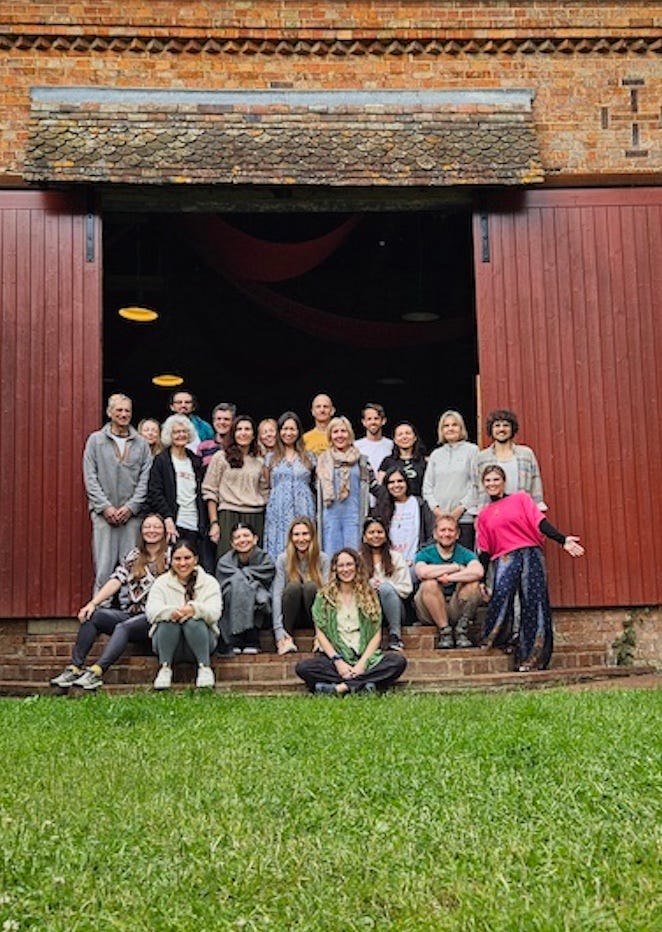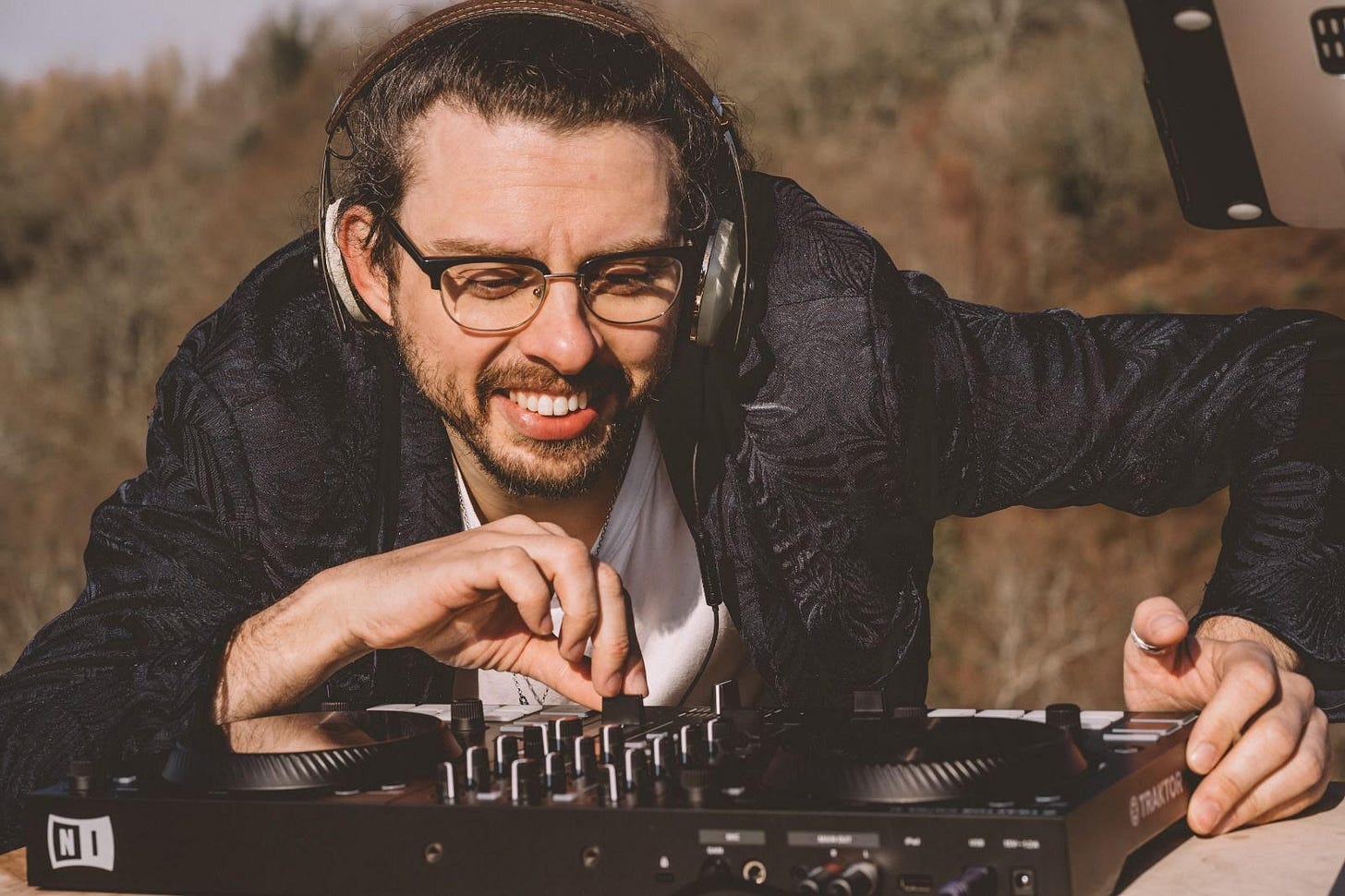How To Put Down Your Mask
Sharing circles allow us to express more of who we really are.
Date for Your Diary: Jules De Vitto and I will shortly be announcing details of an exciting one-day HSP Retreat we’re co-facilitating at this beautiful venue, House of Transformation in East London on Saturday, September 14. Hope to see you there!
And here’s the waiting list for our next HSP Retreat in the summer of 2025.
For many people, entering any kind of group environment can pose challenges — especially if we’re among the 20-30 percent of the population who are highly sensitive. Many Highly Sensitive People (HSPs) worry acutely about how others might react if they were to express what they really think and feel.
We’re so sensitive to social cues that we can experience a wave of shame or anxiety if we sense something we offer isn’t fully landing. We might read volumes into the briefest of facial expressions, scanning for signs that we’re being judged or perceived negatively — or that we’ve caused offence.
Our lack of confidence, and frequent feeling we don’t fit in, means that many of us struggle to open up to others, or know our true worth.
In his book The Myth of Normal, Dr Gabor Maté explores the tension between our need for “attachment” (a sense of belonging and feeling seen), and “authenticity” (our need to express our true selves).
Dr Maté explains that we often face a dilemma: Do I become more of myself by embracing my authenticity? Or do I give up a part of myself in order to belong, and therefore satisfy my need for attachment?
In infancy, we need attachment to survive. We’re entirely dependent on our parents to soothe us, mirror our experience, provide validation, and care for our physical wellbeing. Even the best of intentioned parents will never attune to us perfectly all the time, and so we soon learn to suppress our emotions in order to get our needs met. As infants, when faced with a choice between attachment and authenticity, we’ll choose attachment every time.
HSPs often carry this need for attachment over into adulthood by becoming people-pleasers — seeking approval and validation by sacrificing our own needs on behalf of others. We then face a lifelong struggle to become ourselves again. But I’ve learned from the many HSPs I’ve worked with that we can heal these patterns at any age and stage.
My Past Dread of Groups
For many years, starting in childhood, group situations would fill me with a sense of dread. In my twenties, I thought I suffered from social anxiety since I became so overwhelmed in groups. Even just introducing myself in a work meeting, I would experience so much anticipatory anxiety as I rehearsed what I would say in my head, my heart would pound, and my hands would shake. By the time it was my turn to speak, I would stumble over my words, finding that they would come out in completely the wrong order, and my face would burn up. Even though I had plenty to say, I wasn’t able to express myself in the way I wished, and afterwards I would do a post-mortem, cringing at my performance, and worrying about being judged. .
It was only once I began to confront unresolved trauma and losses, that I began to discover the power of group work at an even deeper level. When I stumbled across a sweat lodge ceremony in Oxfordshire in my late twenties, I finally understood what it meant for my nervous system to feel safe and held. The community was so incredibly supportive, and for the first time in my life I truly felt comfortable in being vulnerable in front of others, and never felt judged. Nobody tried to rescue me from my pain — but they did bear witness — and it was in those types of spaces that I did some of the most profound healing work on myself.
Our HSP Retreat
Those experiences left me with a deep sense of mission to create and facilitate such spaces for others. I deeply believe that when spaces are safely held, they can lead us to the deepest layers of transformation, and more self-understanding, empowerment, and connection to purpose. I feel no greater joy than when I’m organising and holding a space like the HSP Retreat I ran two weeks ago with transpersonal coach and trainer Jules De Vitto, and our team including Alan Piatnek, Josh Silver, and wonderful volunteers.
I also understand how signing up for a community retreat like this could be potentially intimidating for many HSPs, bringing up responses from excitement and a sense of possibility, to fear of the unknown, uncertainty, and resistance.
Worries can also arise in our minds such as, I get exhausted when I’m around people for too long, and need my alone time too. Or, I don’t want people to worry about me if I don’t attend all the sessions.
Jules and I built on our many years of work with HSPs to intentionally design a unique retreat experience that would give everyone the time and space they needed.
One participant told me that they’d particularly valued the feeling of being allowed to be precisely where they were, and not having to put on a pretence, or brave face:
“I felt safe enough to be there with my post break-up stuff. Some retreats you go on and it’s always striving forward toward something and you don’t feel you can fully relax. There’s always a programme going from an A to B and that can be tiring. You can’t always just be as you are. You’ve got to be with whatever the programme is, despite what you’re feeling. It was wonderful to be at the Quadrangle and just be left to be with what I’m feeling.”
Some participants spoke of their anxiety around speaking up in groups, and not seeing themselves as ‘group’ people. Others shared that they had always seen themselves as socially anxious or shy. Over the course of the retreat, some had realisations that perhaps their past challenges in social situations were more about the environments they’d been in, or due to being around people who they feared would judge or reject them if they revealed more of their true selves.
Yet, when a group has clear agreements and principles in place, we can create a space where every single person can begin to lower their guard, and share more of who they truly are. (Our agreements include confidentiality; always having an option to be in silence; recognising that listening and is just as important as speaking; speaking from our own experience, and not offering advice, unless explicitly invited).
In a sharing circle, I believe we have an opportunity to practice showing up with more vulnerability, and we also begin to experience what it feels like to be seen and witnessed for who we are deep down inside. This brings healing to the younger parts of us that have never felt truly seen, heard or understood.
It was beautiful to see people over the course of the three-day retreat start to let go of self-consciousness, and allow themselves to tap into their unique creativity, connect with music, and freely dance.
By the end, participants seemed less distracted, and more capable of both listening and expressing themselves in vulnerable ways.
I also heard stories of people who felt less alone, who experienced transformative energetic shifts during the ecstatic dance or the breathwork sessions, or who had felt truly present for the first time in ages as they painted their mandala.
I truly believe that the journey to empowerment as a sensitive person is best undertaken in community, and that we’re more likely to find ourselves through being around like-minded others.
As Helen Keller said: “Alone, we can do so little; together, we can do so much.”
Many times in our lives, relationships have hurt us. However, building new connections in supportive spaces also has the potential to heal us.
So I’d invite HSPs to be brave, and take a step toward finding communities where you feel safe enough to be yourself, while bringing compassion to the parts of you that feel worried and scared.
As my co-facilitator Jules has shown in this short reel below, we take inspiration from Brené Brown’s wise words:
“Don’t walk through the world looking for evidence that you don’t belong, because you will always find it. Don’t walk through the world looking for evidence that you’re not enough, because you’ll always find it. Our worth and our belonging are not negotiated with other people; we carry those inside of our hearts. I know who I am; I’m clear about that, and I’m not going to negotiate that with you. Because then I may fit in for you, but I no longer belong to myself, and that is a betrayal I am not willing to do anymore.”
Jules and I are already planning our annual 2025 retreat and other exciting gatherings over the course of the year for HSPs. If you’re interested in joining us, please do add yourself to our waiting list to be the first to hear announcements.
See you soon,






